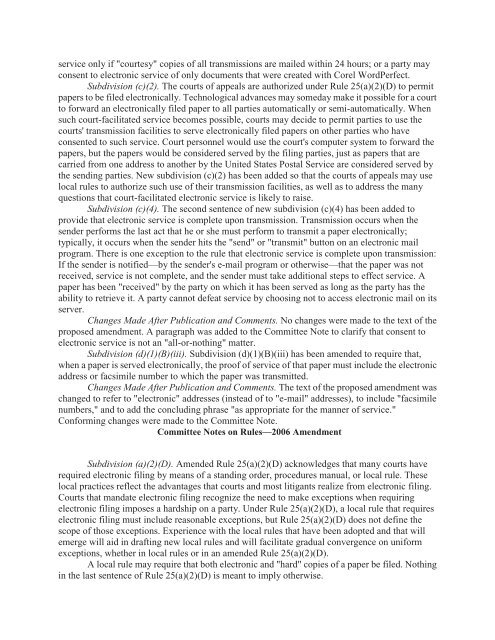Federal Rules of Appellate Procedure 2014-2015, 2014a
Federal Rules of Appellate Procedure 2014-2015, 2014a
Federal Rules of Appellate Procedure 2014-2015, 2014a
Create successful ePaper yourself
Turn your PDF publications into a flip-book with our unique Google optimized e-Paper software.
service only if "courtesy" copies <strong>of</strong> all transmissions are mailed within 24 hours; or a party may<br />
consent to electronic service <strong>of</strong> only documents that were created with Corel WordPerfect.<br />
Subdivision (c)(2). The courts <strong>of</strong> appeals are authorized under Rule 25(a)(2)(D) to permit<br />
papers to be filed electronically. Technological advances may someday make it possible for a court<br />
to forward an electronically filed paper to all parties automatically or semi-automatically. When<br />
such court-facilitated service becomes possible, courts may decide to permit parties to use the<br />
courts' transmission facilities to serve electronically filed papers on other parties who have<br />
consented to such service. Court personnel would use the court's computer system to forward the<br />
papers, but the papers would be considered served by the filing parties, just as papers that are<br />
carried from one address to another by the United States Postal Service are considered served by<br />
the sending parties. New subdivision (c)(2) has been added so that the courts <strong>of</strong> appeals may use<br />
local rules to authorize such use <strong>of</strong> their transmission facilities, as well as to address the many<br />
questions that court-facilitated electronic service is likely to raise.<br />
Subdivision (c)(4). The second sentence <strong>of</strong> new subdivision (c)(4) has been added to<br />
provide that electronic service is complete upon transmission. Transmission occurs when the<br />
sender performs the last act that he or she must perform to transmit a paper electronically;<br />
typically, it occurs when the sender hits the "send" or "transmit" button on an electronic mail<br />
program. There is one exception to the rule that electronic service is complete upon transmission:<br />
If the sender is notified—by the sender's e-mail program or otherwise—that the paper was not<br />
received, service is not complete, and the sender must take additional steps to effect service. A<br />
paper has been "received" by the party on which it has been served as long as the party has the<br />
ability to retrieve it. A party cannot defeat service by choosing not to access electronic mail on its<br />
server.<br />
Changes Made After Publication and Comments. No changes were made to the text <strong>of</strong> the<br />
proposed amendment. A paragraph was added to the Committee Note to clarify that consent to<br />
electronic service is not an "all-or-nothing" matter.<br />
Subdivision (d)(1)(B)(iii). Subdivision (d)(1)(B)(iii) has been amended to require that,<br />
when a paper is served electronically, the pro<strong>of</strong> <strong>of</strong> service <strong>of</strong> that paper must include the electronic<br />
address or facsimile number to which the paper was transmitted.<br />
Changes Made After Publication and Comments. The text <strong>of</strong> the proposed amendment was<br />
changed to refer to "electronic" addresses (instead <strong>of</strong> to "e-mail" addresses), to include "facsimile<br />
numbers," and to add the concluding phrase "as appropriate for the manner <strong>of</strong> service."<br />
Conforming changes were made to the Committee Note.<br />
Committee Notes on <strong>Rules</strong>—2006 Amendment<br />
Subdivision (a)(2)(D). Amended Rule 25(a)(2)(D) acknowledges that many courts have<br />
required electronic filing by means <strong>of</strong> a standing order, procedures manual, or local rule. These<br />
local practices reflect the advantages that courts and most litigants realize from electronic filing.<br />
Courts that mandate electronic filing recognize the need to make exceptions when requiring<br />
electronic filing imposes a hardship on a party. Under Rule 25(a)(2)(D), a local rule that requires<br />
electronic filing must include reasonable exceptions, but Rule 25(a)(2)(D) does not define the<br />
scope <strong>of</strong> those exceptions. Experience with the local rules that have been adopted and that will<br />
emerge will aid in drafting new local rules and will facilitate gradual convergence on uniform<br />
exceptions, whether in local rules or in an amended Rule 25(a)(2)(D).<br />
A local rule may require that both electronic and "hard" copies <strong>of</strong> a paper be filed. Nothing<br />
in the last sentence <strong>of</strong> Rule 25(a)(2)(D) is meant to imply otherwise.


















